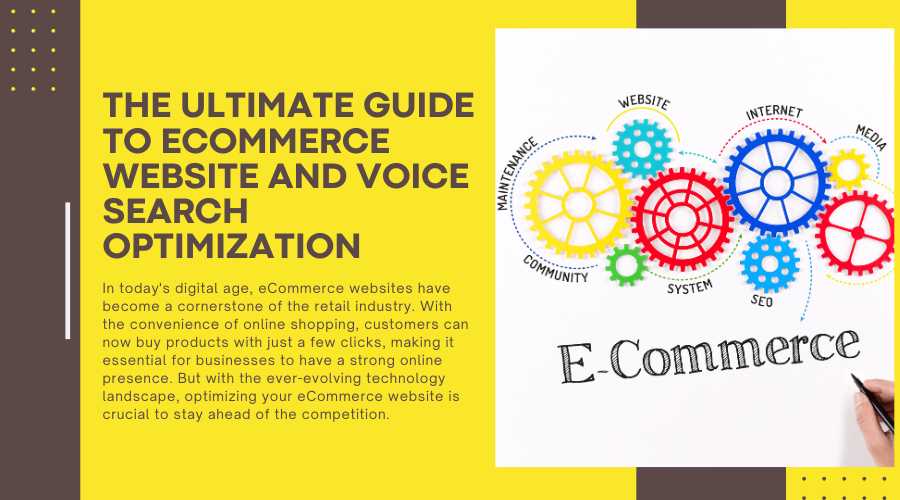In today’s digital age, eCommerce websites have become a cornerstone of the retail industry. With the convenience of online shopping, customers can now buy products with just a few clicks, making it essential for businesses to have a strong online presence. But with the ever-evolving technology landscape, optimizing your eCommerce website is crucial to stay ahead of the competition.
When it comes to eCommerce website optimization, businesses in Dubai, a bustling hub of commerce, understand the significance of effective Ecommerce Web Design Dubai. With its dynamic market and diverse customer base, Dubai demands websites that not only showcase products but also provide an immersive and user-friendly experience. E-commerce Web Design Dubai goes beyond aesthetics; it focuses on creating responsive and visually appealing websites tailored to the unique needs and preferences of Dubai’s discerning consumers. In this guide, we will explore the world of eCommerce website optimization and delve deeper into the specialized realm of Ecommerce Web Design Dubai, highlighting the strategies and elements that can set your online store apart in this thriving market.
Understanding the Importance of eCommerce Website Optimization
Why Optimize Your eCommerce Website?
E-commerce website optimization involves enhancing various aspects of your online store to improve user experience, increase visibility on search engines, and ultimately boost sales. Here’s why it’s essential:
- Improved User Experience: A well-optimized eCommerce website provides a seamless and user-friendly experience, which keeps customers engaged and encourages repeat visits.
- Higher Search Engine Ranking: Optimization helps your website rank higher in search engine results pages (SERPs), making it more likely for potential customers to find your store.
- Increased Conversions: By optimizing your site for user intent, you can lead visitors down the conversion funnel more effectively, resulting in higher sales.
- Competitive Edge: Staying ahead of the competition is crucial in the eCommerce world, and optimization gives you an edge by keeping your site current and efficient.
Key Elements of eCommerce Website Optimization
To effectively optimize your eCommerce website, you should focus on the following key elements:
1. Mobile Responsiveness
In an era where mobile devices dominate internet usage, ensuring your website is mobile-friendly is paramount. A responsive design ensures that your site looks and functions well on smartphones and tablets, providing a positive experience for all users.
2. Page Speed
Slow-loading pages can deter customers and harm your search engine rankings. Optimize images, leverage browser caching, and employ content delivery networks (CDNs) to improve page load times.
3. User-Friendly Navigation
Clear and intuitive navigation is essential for guiding visitors to their desired products. Implement logical menus, breadcrumbs, and filters to simplify the shopping process.
4. High-Quality Content
Content is king, even in eCommerce. Ensure product descriptions are informative, engaging, and unique. Additionally, regularly update your blog with relevant articles to improve SEO.
5. Secure Payment Options
Build trust with your customers by offering secure payment options. SSL certificates and reputable payment gateways are essential for safeguarding sensitive information.
6. Product Images and Videos
Visual content is compelling. Use high-quality images and product videos to showcase your products from various angles and provide a better understanding of their features.
7. Customer Reviews and Ratings
Positive reviews and ratings can significantly impact purchasing decisions. Encourage customers to leave feedback and respond promptly to any negative reviews.
8. SEO Optimization
Implement proper on-page and off-page SEO techniques to enhance your website’s visibility on search engines. This includes optimizing meta titles, descriptions, and using relevant keywords.
Now that we’ve covered the essentials of eCommerce website optimization let’s explore the emerging trend of voice search and how it can further enhance your online store.
Related read – eCommerce Packaging: Sustainable and Memorable
The Rise of Voice Search
What is Voice Search?
Voice search is a technology that allows users to perform online searches using voice commands. Instead of typing queries into a search engine, users can simply speak into their devices to get instant results. This technology has gained immense popularity thanks to virtual assistants like Siri, Google Assistant, and Amazon’s Alexa.
Why is Voice Search Important for eCommerce?
Voice search is rapidly changing the way people search for information and products online. Here’s why it’s essential for eCommerce businesses:
- Convenience: Voice search is hands-free and faster than typing, making it incredibly convenient for users. This convenience can lead to more impulsive purchases.
- Natural Language: Voice searches tend to be more conversational and natural, which means eCommerce websites need to adapt to understand and respond to these queries effectively.
- Local Search: Many voice searches are location-based, making them invaluable for businesses with physical stores. Optimizing for local voice search can drive more foot traffic.
Optimizing Your eCommerce Website for Voice Search
To make the most of voice search, consider these strategies:
1. Use Natural Language Keywords
Voice search queries are often longer and more conversational. Incorporate long-tail keywords and phrases that mimic how people speak when searching.
2. Local SEO
Ensure your business information is accurate and up-to-date on platforms like Google My Business. This will help your website appear in local voice search results.
3. Schema Markup
Implement schema markup to provide search engines with structured data about your products and services, making it easier for them to understand and display relevant information in voice search results.
4. Featured Snippets
Target featured snippets, which are often read aloud by virtual assistants when responding to voice queries. Structure your content in a way that answers common questions concisely.
5. Mobile Optimization
Since many voice searches come from mobile devices, ensure your website is mobile-friendly and loads quickly.
6. Natural Language Processing (NLP)
Invest in natural language processing technology to understand and respond effectively to voice search queries on your eCommerce site.
Measuring Success and Ongoing Optimization
Tracking Your Progress
After implementing eCommerce website optimization and voice search strategies, measuring your success is crucial. Use tools like Google Analytics to track website traffic, bounce rate, conversion rate, and keyword rankings. This data will help you identify what’s working and where to improve.
Ongoing Optimization
Remember that eCommerce website optimization is an ongoing process. Search engine algorithms evolve, consumer behavior changes, and new technologies emerge. Stay updated with industry trends and regularly audit and refine your website to maintain a competitive edge.
Conclusion
In today’s competitive eCommerce landscape, optimizing your website for both traditional search and voice search is no longer optional—it’s a necessity. By focusing on mobile responsiveness, page speed, user-friendly navigation, high-quality content, and secure payment options, you can create a strong foundation for your online store. Embracing voice search and its unique optimization strategies will help you stay ahead in the ever-evolving world of eCommerce. Keep measuring your progress and adapting to changes, and your eCommerce business will thrive in the digital era.
Read the next blog – Dubai’s Choice: Prontosys as the Best Digital Marketing Agency











